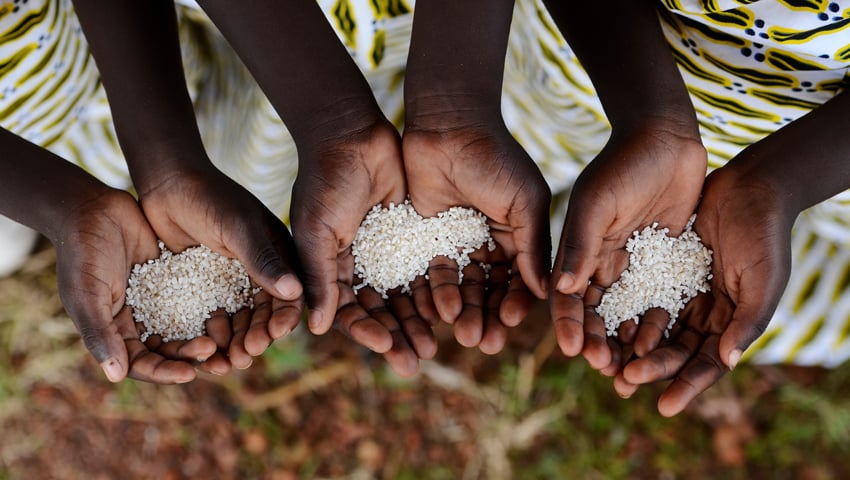THE UK will launch a new science centre where experts will develop climate resilient crops and identify risks to global food systems, Prime Minister Rishi Sunak has announced. The venture will be unveiled at the Global Food Security Summit in London, which the UK is hosting alongside Somalia, UAE, the Children’s Investment Fund Foundation (CIFF) and Bill & Melinda Gates Foundation.
In his opening speech the Prime Minister will urge the international community to address the underlying causes of food insecurity, build more resilient food systems and to act now to prevent food crises and malnutrition.
The new virtual science hub, will be led by CGIAR, a global research partnership which unites international organisations working on food security will make global food systems more resilient to future shocks in a changing climate. It will link UK scientists with research initiatives that will develop crops that can withstand the impacts of climate change and are more disease resistant.
The UK’s new International Development White Paper on food insecurity is also expected to be announced on Monday at the summit.
A spokesperson for the UK Foreign, Commonwealth & Development Office said, “The White Paper is set to address food insecurity as one of the pressing global challenges, setting out how the UK will go beyond giving aid money and instead work in partnerships with countries to tackle extreme poverty and climate change.
“Climate change, conflict, the long-term impacts of Covid-19 and the effects of Russia’s invasion of Ukraine on global food supply are the main drivers of current food insecurity.”
International Development Minister Andrew Mitchell said, “Many children go to bed hungry and malnourished. At this summit, the UK and its partners will be united in our determination to change that. Cutting edge science and innovative partnerships will help Britain create a healthier, more secure and prosperous world for us all.
“Today we will launch the UK International Development White Paper, setting out our long-term vision for addressing critical global challenges, including preventing and treating child wasting, through new partnerships and sources of finance. The Global Food Summit is a practical example of how we are already working to make that vision happen.
“Flood-tolerant rice, disease-resistant wheat, biofortified and vitamin-rich sweet potatoes are just some of the improved crops the UK has so far helped to develop through CGIAR’s advanced crop breeding.”
Scepticism
News of the summit was greeted with scepticism by some working in the food and agriculture sector.
Vicki Hird, Strategic Lead on Agriculture a The Wildlife Trusts, said, “We produce enough food globally to feed 11 billion – it’s just not being distributed or used well. So, whilst a focus on food security is vital, the discussion and outcomes need to tackle the deep drivers of insecurity globally which are clearly inequality, poverty, climate change, and degraded ecosystems and nature. Developing agroecological approaches, new crops and tech will help especially for site specific ecosystem or productivity issues, the real drivers and nutritional food security must be top of the agenda.”
ffinlo Costain, Founder of the Food & Global Security Network, went further. He said, “A singular focus on food security can in itself be damaging. Food security is a subset of ecological security. If people think the solution is simply to produce more food, while externalising the ecological costs, then that’s simply loading even more insecurity into tomorrow’s food system. By definition it’s unsustainable.
“Ecological security – which is what we should be talking about – aims to deliver nutritious, healthy food and a greater seasonal diversity of it, but it also targets roots causes, including climate change mitigation and adaptation and biodiversity regeneration from the soil up. It means eliminating fossil fuels from the food system while managing land differently so that we replace fossil-based energy with photosynthesis and a healthy soil biome that cycles nutrients and water effectively.
“Unfortunately this summit, focussed as it is on bioengineering, is addressing the symptoms rather than the causes of food insecurity. Bioengineering may play a role in alleviating hunger, but it cannot solve food insecurity.”
At the summit the Prime Minister announced that the UK is providing more support to the Child Nutrition Fund. The funding will mean it can scale up its support for breastfeeding, infant feeding and health care and improve monitoring of what best manages and prevents the worst forms of child malnutrition.
UK support will also match pound for pound the amount the worst affected countries including Uganda, Ethiopia and Senegal invest of their own resources in tackling the issue. This will help secure a more reliable supply of critical food for young children suffering from the worst form of malnutrition.
